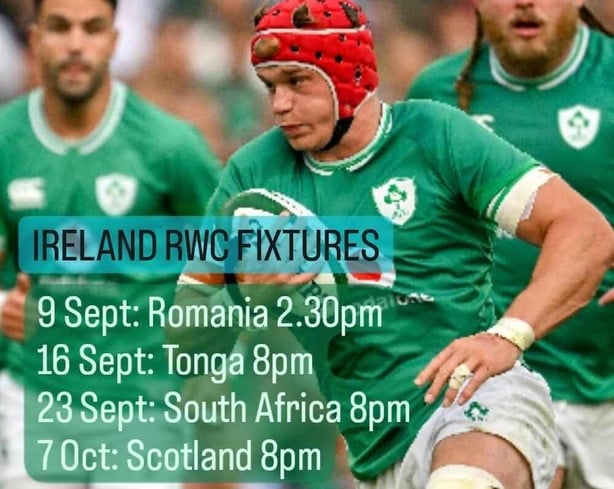After a weekend where Fiji beat England, France thrashed Australia and Ireland were given a real scare by Samoa, it would take something big to dominate this week's rugby discourse.
South Africa's 35-7 win against New Zealand did just that.
It was a game that stood out for several reasons; not only was it the heaviest defeat ever inflicted on the All Blacks, but they were seven minutes away from being held scoreless in a Test for the first time in 59 years.
South Africa's start to the game was also remarkable, dominating New Zealand up front, particularly at the maul with the All Blacks conceding eight penalties and giving up two yellow cards in the first 15 minutes alone.
Somehow, none of that has dominated the conversation this week, with the biggest talking point being around the make-up of the South Africa replacements bench.
In recent years the world champions have often loaded up on power, favouring a 6:2 split of forwards to backs on the bench, but that ratio became 7:1 on Friday night when full-back Willie le Roux was a late withdrawal from the side, to be replaced by flanker Kwagga Smith.
The reaction has been polarising, particularly here in Ireland where former Scotland coach Matt Williams and ex-international referee Owen Doyle have both called for World Rugby to act, with Williams saying it is against the spirit of the game, while Doyle cited safety concerns.
However, speaking on the RTÉ Rugby podcast this week, former Ireland hooker Bernard Jackman said he welcomed the creativity from the Springboks' coaches.
Bernard Jackman and Mick Kearney discuss the infamous Springbok bench
"I love it," Jackman said.
"I personally believe that we should be lauding coaches who are taking risks or being creative. Obviously they have a profile of player that a lot of us don't have, and a lot of countries would be afraid to go 6:2, because it doesn't suit the profile of players they have.
"They should be allowed, and encouraged to play it."
And the former Grenoble and Dragons coach said the blurring of the lines between forward and backs could lead to more "hybrid" players in the game.
"I would love to play South Africa if they went 7:1 against Ireland. I don't think they will, but there's a massive risk to that.
"I know Kwagga [Smith] has played 140 or 150 games with Sevens and could play in the centre or on the wing. I know France have Macalou [Sekou Macalou] who can play 7 or wing. Fair play to them, the hybrid player increases the multi-skilled players' opportunity to play at the highest level."
Jackman also believes the impact of the South African bench has been overblown.

The Boks unleashed all seven of those replacement forwards after 47 minutes of Friday's 35-7 win, with South Africa only outscoring New Zealand 14-7 in the final 33 minutes.
"It was 21-0 to South Africa when they brought on those subs, the first choice pack had done the damage. It wasn't anything to do with the bench coming on and winning the game late, and players' safety. It's fearsome, and you have to be able to deal with it," he added.
Former Leinster, Connacht and Ulster lock Mick Kearney joined Jackman on the podcast, and agreed that the creative thinking of the South African coaches should be encouraged.
And Kearney added that while it worked out for the world champions on Friday, the inherent risk that comes with the tactic has been lost in the conversation.
"If teams want to try different things, or they want to be creative around what their plan is going into games, there is a level of risk, but as we saw on Friday night there's also massive reward that can come," Kearney said.
"Kwagga Smith has a huge amount of experience in Sevens, so the risk is that if he has to come on on the wing, you're trying to drop bombs on him as much as possible for the rest of the game, from a kicking strategy point of view.
"It worked out the other night, there was no injuries in the back three and he came on and pilfered a load of ball."
And Jackman agreed that the heavy risk involved with the 7:1 bench split means we're unlikely to see the Springboks try it out in a knockout game at the World Cup.
"There's a risk. It happened last-minute, and I don't know if Rassie would do it against New Zealand or France in a quarter-final, because if you get an injury to a back early [you're in trouble].
"Not so long ago there was a debate about whether it was crazy to go 6:2 [on the bench], and it backfires if there are injuries earlier.
"I love seeing a strategy that looks foolproof and other teams copy. Have the Boks found a way of taking that apart? Will that prove to be a key weapon for them in the World Cup? Or, have they shown their hand now?
"I love the bit of creativity by Rassie. There's an inherent risk to it, and that's what we want. We shouldn't be talking about changing the rules or player safety, it's sour grapes and it sounds like you're scared. Just do what you do well, and be able to beat them."
Listen to the RTÉ Rugby podcast on Apple Podcasts, Soundcloud, Spotify or wherever you get your podcasts.
Listen to live coverage of all of Ireland's Rugby World Cup games on RTÉ Radio or follow our live blogs on RTÉ.ie and the RTÉ News app.
Watch live coverage of Ireland v Tonga (Saturday 16 September) and South Africa (Saturday 23 September) on RTÉ2 and RTÉ Player.


